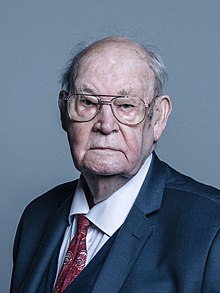Robert Hughes, Baron Hughes of Woodside
The Lord Hughes of Woodside | |
|---|---|
 Hughes in 2018 | |
| Shadow Secretary of State for Transport | |
| In office 4 November 1985 – 23 November 1988 | |
| Leader | Neil Kinnock |
| Preceded by | Gwyneth Dunwoody |
| Succeeded by | John Prescott |
| Parliamentary Under-Secretary of State for Scotland | |
| In office 11 March 1974 – 22 July 1975 | |
| Prime Minister | Harold Wilson |
| Preceded by | Hector Monro |
| Succeeded by | Frank McElhone |
| Member of Parliament for Aberdeen North | |
| In office 18 June 1970 – 1 May 1997 | |
| Preceded by | Hector Hughes |
| Succeeded by | Malcolm Savidge |
| Personal details | |
| Born | Robert Hughes 3 January 1932 Aberdeen, Scotland |
| Nationality | British |
| Political party | Scottish Labour |
Robert Hughes, Baron Hughes of Woodside (born 3 January 1932)[1] is a British Labour Party politician and was also Chair of the British Anti-Apartheid Movement (AAM) from 1976 until it was dissolved in 1995 after the ending of apartheid in South Africa.
Early life[]
Hughes was educated at Robert Gordon's College, Aberdeen and in South Africa, where he lived from 1947 until 1954 and worked as a draughtsman.
Political career[]
Hughes first stood for Parliament in 1959 at North Angus and Mearns, where he came second to the Conservative incumbent Colin Thornton-Kemsley. He was the Member of Parliament (MP) for Aberdeen North from 1970 to 1997.[2]
Hughes was Parliamentary Under-Secretary of State for Scotland from March 1974 until July 1975, when he resigned in disagreement with the government's incomes policy.
The infamous 1979 vote of no confidence resulted from the Labour government overturning the "Yes" result of the Scottish devolution referendum. Rather than the SNP, prime minister James Callaghan blamed unionist rebels on his own benches for ultimately bringing about the collapse of his government and opening the door to victory for Margaret Thatcher's Conservatives. Hughes was one of those rebels. Tam Dalyell, Peter Doig, and Adam Hunter were the other Scottish Labour MPs who helped overturn the "Yes" vote.[3]
In November 1985, Hughes was appointed to the Shadow Cabinet as Shadow Secretary of State for Transport.[4] On 27 September 1997, he was created a life peer as Baron Hughes of Woodside, of Woodside in the City of Aberdeen.[5][6] He is a patron of Humanists UK.[7]
Anti-Apartheid Movement[]
Under his chairmanship the Anti-Apartheid Movement campaigned against the Thatcher government's refusal to impose sanctions against South Africa in the 1980s and organised the 1988 ‘Free Mandela’ concert at Wembley Stadium which was televised by the BBC and broadcast around the world. Hughes attended the independence celebrations in Namibia in 1990 and acted as an observer at South Africa's first democratic elections in April 1994. After the dissolution of the AAM he became the first Chairperson of its successor organisation, Action for Southern Africa (ACTSA).
Hughes's tactics were sometimes critiqued as opportunist by radicals in the movement, such as the City of London Anti-Apartheid Group, examples being his attitude towards the Common Wealth games and censorship of material within the AAM that related to the Non-Stop Picket. In July 1986, the Commonwealth Games was held in Edinburgh. In protest at the Thatcher government's support for apartheid and refusal to implement the sports boycott of South Africa, 32 of the 59 Commonwealth nations boycotted the Games. This could have been an opportunity for the Anti-Apartheid Movement to raise the profile of its boycott campaign. Instead, Hughes and Brian Filling, the Scottish Secretary of the AAM, signed a letter, organised by the Scottish Trade Union Congress and published in The Scotsman newspaper, calling on those Commonwealth nations to call off their boycott. Secondly, at the AAM's annual general meeting in 1986, Hughes and Roberts refused to hear 'motion 16' which resulted in the continued censorship of material relating to an ongoing picket of the South African Embassy in London that would last nearly four years.[8]
References[]
- ^ "The Rt Hon Lord Hughes of Woodside". Debrett's. 2013. Archived from the original on 16 December 2013. Retrieved 18 March 2019.
- ^ Julian Desborough et al. (compilers) (1992). The Times Guide to the House of Commons, April 1992. Times Books Ltd. ISBN 0-7230-0497-8.
- ^ Callaghan, James (2006). Time and Chance. London: Politico's Publishing Ltd. ISBN 9781842751800.
- ^ Trotter, Stuart (5 November 1985). "Transport job goes to Hugues". The Glasgow Herald. p. 7.
- ^ "No. 54907". The London Gazette. 1 October 1997. p. 11063.
- ^ House of Lords biography
- ^ Distinguished Supporters of BHA
- ^ Brown, Gavin (5 January 2012). ""Stand down Bob!": or, the struggle for effective anti-apartheid solidarity". Non-Stop Against Apartheid. Retrieved 29 May 2019.
External links[]
- Hansard 1803–2005: contributions in Parliament by Robert Hughes
- 1932 births
- Living people
- Amalgamated Engineering Union-sponsored MPs
- People educated at Robert Gordon's College
- Members of the Parliament of the United Kingdom for Aberdeen constituencies
- Scottish Labour Party MPs
- Labour Party (UK) life peers
- Life peers created by Elizabeth II
- UK MPs 1970–1974
- UK MPs 1974
- UK MPs 1974–1979
- UK MPs 1979–1983
- UK MPs 1983–1987
- UK MPs 1987–1992
- UK MPs 1992–1997
- British humanists